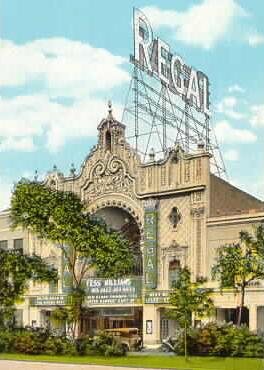Entertainment
The Regal Theater, built in 1930, was one of the only theatres in the "Harlem of Chicago," the Black District between 23rd and 63rd streets. This theatre in particular helped to abolish many employment restrictions that were placed upon blacks in the 1940s. While the majority of the city's theatres would employ few blacks, and mainly as janitors, The staff of The Regal, including ushers, cashiers, musicians, and even managers were black. 8

One of the most universal reactions to the Great Depression was an increased interest in entertainment. During the 1940s, America saw a tremendous rise in all form of entertainment. The radio industry flourished; entire neighborhoods would gather together to listen to their favorite shows. The theatre industry experienced a similar boom; trips to the movies or theatre became more and more frequent. Entertainment was used primarily as an escape from the stress created by the Depression. People found themselves so encompassed in their favorite shows, movies, and plays that they forgot all about many of their problems.
For blacks, however, these forms of entertainment were slightly different. Though blacks enjoyed radio entertainment just as much as the white people, they found themselves repeatedly criticized. Amos and Andy, one of the most popular programs of the era, involved two white men satirically portraying blacks. The skits magnified stereotypes of black speech, work ethic, and intelligence.
Since you can no longer stand the incessant denunciation of the radio, you decide to go to the theatre. Please select your movie theatre.
The Regal *.*.* *.* *.*.* The Chicago Theater
 *.*.*
*.*.* 
The satire found on the radio also traveled to the theater venues of entertainment. Besides the similar racial content of the radio, blacks were frequently confined to certain sitting sections, usually in the back rows of the balconies.
Despite the aforementioned inequalities and hassling by employees, the blacks still ventured to the theatres to rid themselves of the troubles of life. In Native Son, Bigger's only escape from gang violence on the streets, life in a one-room home with three other people, and constant degradation is the theatre.
As the scenes unfolded his interest was caught and he leaned forward. He saw images of smiling, dark-haired white girls lolling on the gleaming sands of a beach. The background was a stretch of sparkling water. Palm trees stood near and far...
"I'd like to be there," [said Jack].
"You can," Bigger said. "But you'd be hanging from a tree like a bunch of bananas...."9
Through his conversation with Jack, Bigger reminds his friend that because of their skin color they will never be able to experience paradise. Unlike the white people of society, they cannot experience the male dream of frolicking on the beach, surrounded by white women. If any black man were ever caught in the paradise shown on the screen, he would be violently hung, lynched, or drowned. Thus, despite the rudeness of employees, redundancy of shows, and need for money, blacks like Bigger continued to flock to the theatres in order to immerse themselves in utopia.